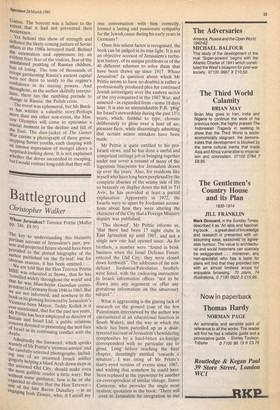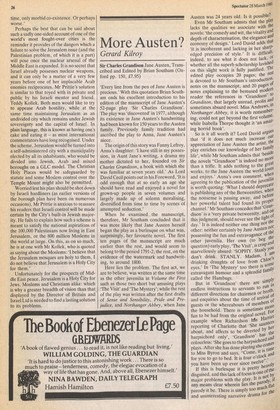Battleground
Christopher Walker
Whose Jerusalem? Terence Prittie (Muller PP. 246, £995) The key to understanding this blatantly partisan account of Jerusalem's past, Present and projected future should have been Provided in the potted biography of the author published on the fly-leaf: but for obvious reasons, it has been omitted. We are told that the Hon Terence Prittie MBE was educated at Stowe, that he has 'travelled widely throughout the world' and that he was Manchester Guardian correspondent in Germany from 1946 to 1963. But we are not informed, and nowhere in the book or its glowing foreword by Jerusalem's Viennese-born Mayor, Teddy Kollek is it ever mentioned, that for the past ten years, Mr Prittie has been employed as director of Britain and Israel Ltd, a public' relations concern devoted to presenting the best face of Israel in its continuing conflict with the Arabs.
Admittedly the foreword, which speaks warmly of Mr Prittie's 'yeoman service' and the carefully selected photographs, including one of an unarmed Israeli soldier gingerly helping a blind Arab down steps in the annexed Old City, should make even the most gullible reader a little wary. But Without some guidance, how is he or she expected to divine that the Hon Terence son of the late Baron Dunallcy is an engaging Irish Zionist, who, if I recall my Irish Zionist, who, if I recall my one conversation with him correctly, formed a lasting and passionate sympathy for the Jewish cause during his early years in Germany?
Once this salient factor is recognised, the book can be judged in its true light. It is not an objective account of Jerusalem's turbulent history, of its unique problems or of the 40 different schemes to solve them that have been drawn up since 1917. Whose Jerusalem? (a question about which Mr Prittie seems to have no doubts) is rather a professionally produced plea for continued Jewish sovereignty over the eastern sector of the city conquered in the 1967 War, and annexed in expanded form some 18 days later. It is also an unmistakeable P.R. 'plug' for Israel's stewardship during the past 131/2 years, which, faithful to type, chooses deliberately to gloss over a host of unpleasant facts, while disarmingly admitting that certain minor mistakes have been made.
Mr Prittie is quite entitled to his proIsraeli views, and he has done a useful and competent cuttings job in bringing together under one cover a resume of many of the ingenious blueprints for Jerusalem drawn up over the years. Also, for residents like myself who have long been perplexed by the complete absence of the seamy side of life so brazenly on display down the hill in Tel Aviv, he has provided at least a partial explanation. Apparently in 1972, the Israelis were so upset by Jordanian accusations about how they were altering the character of the City that a Foreign Ministry inquiry was published.
'This showed', Mr Prittie informs us, 'that there had been 17 night clubs in East Jgrusalem up until 1967, and not a single new one had opened since. As for brothels, a number were "found in brisk business when the Israel Defence Forces entered the Old City: they were closed down forthwith". The addresses of the now defunct Jordanian/Palestinian brothels were listed, with the endearing instruction to Israeli information offices -not to be drawn into any argument or offer any gratuitous information on this unsavoury subject".' .
What is aggravating is the glaring lack of research on the ground (one of the few Palestinians interviewed by the author was encountered at an educational function in South Wales), and the way in which the whole has been parcelled up as a disinterested account of Jerusalem's bewildering complexities by a hard-bitten ex-foreign correspondent with no particular axe to grind. Long before reaching the final chapter, dauntingly entitled 'towards a solution', I was tiring of Mr Prittie's starry-eyed version of events since 1967, and wishing that somehow he could have been replaced at the typewriter by another ex-correspondent of similar vintage, James Cameron, who provides the single most realistic quotation in the book: 'There will .ever in Jerusalem be integration in our time, only morbid co-existence. Or perhaps worse.'
Perhaps the best that can be said about such a sadly one-sided account of one of the world's most fought-over cities is the reminder it provides of the dangers which a failure to solve the Jerusalem issue (and the Palestinian problem, of which it is a part) will pose once the nuclear arsenal of the Middle East is expanded. It is no secret that Israel already possesses nuclear weapons, and it can only be a matter of a very few years before one of her implacable Arab enemies reciprocates, Mr Prittie's.solution is similar to that toyed with in private and public by his Israeli mentor and friend. Teddy Kollek. Both men would like to try to appease Arab hostility, while at the same time maintaining Jerusalem as an undivided city which remains under Jewish sovereignty and the capital of Israel. In plain language, this is known as having one's cake and eating it — as most international commentators have long recognised. Under the scheme, Jerusalem would be turned into a self-administered city with a municipality elected by all its inhabitants, who would be divided into Jewish, Arab and mixed boroughs on a GLC model. The Christian Holy Places would be safeguarded by statute and some Moslem control over the Temple Mount might also be permitted, Worried lest his plan should be shot down by Israeli hardliners (as earlier versions of the borough plan have been on numerous occasions), Mr Prittie is anxious to reassure his readers that Israeli control will be made certain by the City's built-in Jewish majority. He fails to explain how such a scheme is meant to satisfy the national aspirations of the 100,000 Palestinians now living in East Jerusalem, or the 800 million Moslems in the world at large. On this, as on so much, he is at one with Mr Kollek, who is quoted as saying about the Moslems: believe that the Jerusalem mosques are holy to them, I do not believe that Jerusalem is a Holy City for them.'
Unfortunately for the prospects of Middle East peace, Jerusalem is a Holy City for Jews, Moslems and Christians alike: which is why a greater breadth of vision than that displayed by the Director of Britain and Israel Ltd is needed to find a lasting solution to its problems.











































 Previous page
Previous page